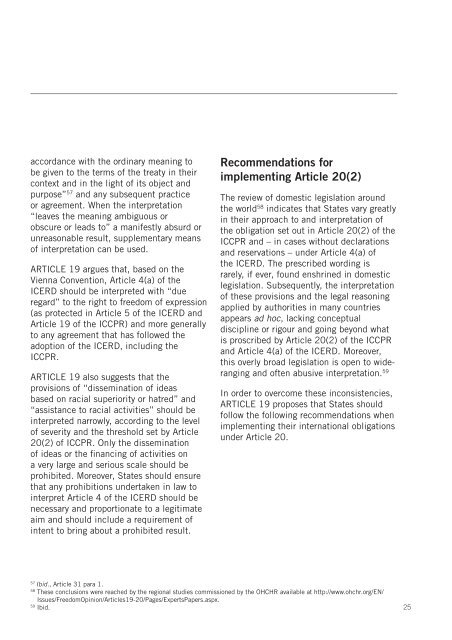ARTICLE-19-policy-on-prohibition-to-incitement
ARTICLE-19-policy-on-prohibition-to-incitement
ARTICLE-19-policy-on-prohibition-to-incitement
Create successful ePaper yourself
Turn your PDF publications into a flip-book with our unique Google optimized e-Paper software.
accordance with the ordinary meaning <strong>to</strong><br />
be given <strong>to</strong> the terms of the treaty in their<br />
c<strong>on</strong>text and in the light of its object and<br />
purpose” 57 and any subsequent practice<br />
or agreement. When the interpretati<strong>on</strong><br />
“leaves the meaning ambiguous or<br />
obscure or leads <strong>to</strong>” a manifestly absurd or<br />
unreas<strong>on</strong>able result, supplementary means<br />
of interpretati<strong>on</strong> can be used.<br />
<str<strong>on</strong>g>ARTICLE</str<strong>on</strong>g> <str<strong>on</strong>g>19</str<strong>on</strong>g> argues that, based <strong>on</strong> the<br />
Vienna C<strong>on</strong>venti<strong>on</strong>, Article 4(a) of the<br />
ICERD should be interpreted with “due<br />
regard” <strong>to</strong> the right <strong>to</strong> freedom of expressi<strong>on</strong><br />
(as protected in Article 5 of the ICERD and<br />
Article <str<strong>on</strong>g>19</str<strong>on</strong>g> of the ICCPR) and more generally<br />
<strong>to</strong> any agreement that has followed the<br />
adopti<strong>on</strong> of the ICERD, including the<br />
ICCPR.<br />
<str<strong>on</strong>g>ARTICLE</str<strong>on</strong>g> <str<strong>on</strong>g>19</str<strong>on</strong>g> also suggests that the<br />
provisi<strong>on</strong>s of “disseminati<strong>on</strong> of ideas<br />
based <strong>on</strong> racial superiority or hatred” and<br />
“assistance <strong>to</strong> racial activities” should be<br />
interpreted narrowly, according <strong>to</strong> the level<br />
of severity and the threshold set by Article<br />
20(2) of ICCPR. Only the disseminati<strong>on</strong><br />
of ideas or the financing of activities <strong>on</strong><br />
a very large and serious scale should be<br />
prohibited. Moreover, States should ensure<br />
that any prohibiti<strong>on</strong>s undertaken in law <strong>to</strong><br />
interpret Article 4 of the ICERD should be<br />
necessary and proporti<strong>on</strong>ate <strong>to</strong> a legitimate<br />
aim and should include a requirement of<br />
intent <strong>to</strong> bring about a prohibited result.<br />
Recommendati<strong>on</strong>s for<br />
implementing Article 20(2)<br />
The review of domestic legislati<strong>on</strong> around<br />
the world 58 indicates that States vary greatly<br />
in their approach <strong>to</strong> and interpretati<strong>on</strong> of<br />
the obligati<strong>on</strong> set out in Article 20(2) of the<br />
ICCPR and – in cases without declarati<strong>on</strong>s<br />
and reservati<strong>on</strong>s – under Article 4(a) of<br />
the ICERD. The prescribed wording is<br />
rarely, if ever, found enshrined in domestic<br />
legislati<strong>on</strong>. Subsequently, the interpretati<strong>on</strong><br />
of these provisi<strong>on</strong>s and the legal reas<strong>on</strong>ing<br />
applied by authorities in many countries<br />
appears ad hoc, lacking c<strong>on</strong>ceptual<br />
discipline or rigour and going bey<strong>on</strong>d what<br />
is proscribed by Article 20(2) of the ICCPR<br />
and Article 4(a) of the ICERD. Moreover,<br />
this overly broad legislati<strong>on</strong> is open <strong>to</strong> wideranging<br />
and often abusive interpretati<strong>on</strong>. 59<br />
In order <strong>to</strong> overcome these inc<strong>on</strong>sistencies,<br />
<str<strong>on</strong>g>ARTICLE</str<strong>on</strong>g> <str<strong>on</strong>g>19</str<strong>on</strong>g> proposes that States should<br />
follow the following recommendati<strong>on</strong>s when<br />
implementing their internati<strong>on</strong>al obligati<strong>on</strong>s<br />
under Article 20.<br />
57<br />
Ibid., Article 31 para 1.<br />
58<br />
These c<strong>on</strong>clusi<strong>on</strong>s were reached by the regi<strong>on</strong>al studies commissi<strong>on</strong>ed by the OHCHR available at http://www.ohchr.org/EN/<br />
Issues/FreedomOpini<strong>on</strong>/Articles<str<strong>on</strong>g>19</str<strong>on</strong>g>-20/Pages/ExpertsPapers.aspx.<br />
59<br />
Ibid.<br />
25


